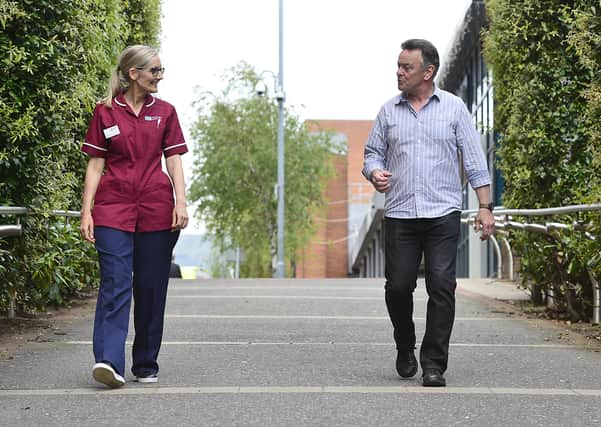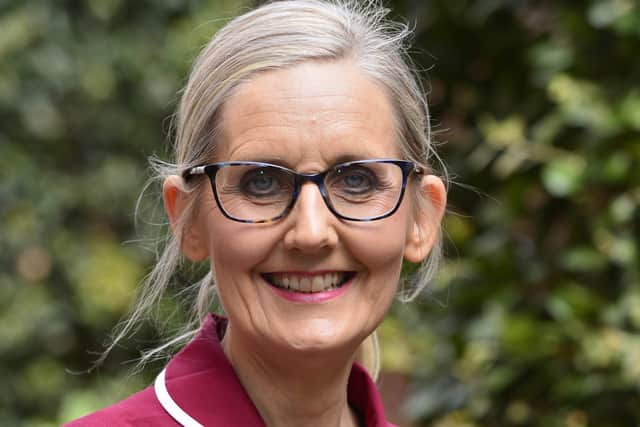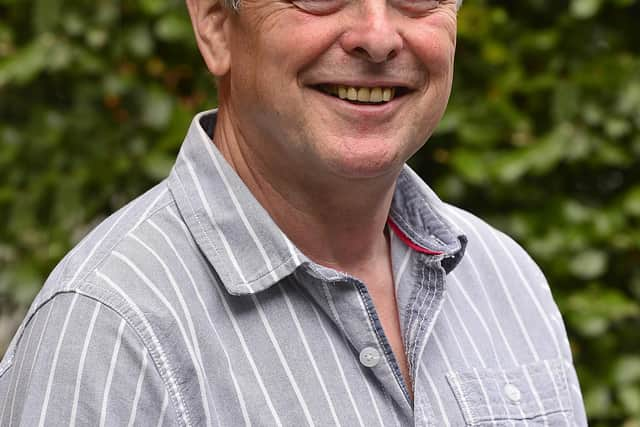Woman who has dedicated her life to helping Ulster’s cancer patients


Ruth Boyd has dedicated 20 years of her life to caring for cancer patients in NI as well as finding a cure for the devastating illness.
The senior research nurse with Cancer Research UK said there is nothing more rewarding than helping people whose lives have been turned upside down by cancer diagnosis.
Advertisement
Hide AdAdvertisement
Hide AdThe Belfast woman said: “It might sound boring being in the same job for 20 years, but I can assure you that couldn’t be further from the truth.


“Clinical research is really dynamic and incredibly hopeful and exciting. I am so privileged to work in a team across Northern Ireland that is absolutely focused on both patient care and high quality research. It just has all these wonderful elements – every day is different.
“I have to emphasise just how amazing the patients are – so willing to get involved to help others.”
In the last 20 years over 25,000 adults and children in Northern Ireland have taken part in hundreds of different cancer research studies.
Advertisement
Hide AdAdvertisement
Hide AdRuth said: “We are all indebted to them for the contribution they make to better care and treatment.”


With a nursing background in Haematology and Bone Marrow Transplant at St Bartholomew’s Hospital, London, Ruth made the decision to come back home and settle down in the Province.
She said: “I have always been interested in research and on my return I was fortunate enough to be successful in getting the first cancer clinical research nurse post in Belvoir Park Hospital, back in 1994. Clearly I must have found my niche in research, as I’ve never looked back.
“I moved to oncology at Belfast City Hospital in 1997, where I became one of two cancer research nurses.
Advertisement
Hide AdAdvertisement
Hide Ad“I was so fortunate to work with the late Professor Patrick Johnston. Of course his passion and vision for cancer research in NI and beyond is renowned.
“Paddy was immensely supportive to clinical research nursing and a driving force in the growth of what is now the NI Cancer Trials Network (NICTN) where I work.”
Ruth has seen a number of significant changes as a result of cancer research: “The obvious one is we have more treatments and they’re more effective treatments.
“The first clinical trials I worked on were about chemotherapy and what drug combinations were best – that’s still important, but now we are in a totally different era where advancing technology and greater understanding of cancer means treatment can be more individualised.
Advertisement
Hide AdAdvertisement
Hide Ad“We want treatments to have as little toxicity as possible, yet be effective, and real progress is being made. Research in the lab and amazing discoveries are of fundamental importance – but that’s not where research ends. To make a difference to patient outcomes it’s also essential that research and clinical trials are embedded into our health service and driving safe and effective high quality care.”
The decision to offer a clinical trial is made if it is felt it could be in the patient’s best interest, but there is no pressure to take part.
Trials are available to patients at every stage of the cancer process, from prevention, screening and diagnosis to treatment and follow up.
Ruth said: “People generally get something from the feeling that they are making a difference. They know that whatever the outcome for themselves they are helping patients in the future, because we will know more through their participation.
Advertisement
Hide AdAdvertisement
Hide Ad“In research nursing we are lucky in that we have a lot of time to spend with people and they feel supported. It is important to listen to what someone is thinking and what their understanding is.
“You need good communication skills. Being completely open and honest helps, so that you can develop a bond of trust. Within research nursing we are able to sustain a relationship with patients over a number of weeks, sometimes months or even years.
“The COVID-19 pandemic has shone a spotlight on the value of research and clinical trials, which is great, however, the consequences of the pandemic have been immense.
“When the first wave of the pandemic hit, the Trials Network and cancer services across Northern Ireland continued to care for patients already taking part in cancer clinical trials.
Advertisement
Hide AdAdvertisement
Hide Ad“After an initial national pause in recruitment I’m delighted that NICTN kept going, continuing to recruit patients and open new studies.”
In 2015 Greenisland man Ken McBride was diagnosed with prostate cancer.
The 60-year-old, who is married to Helen with one grown-up son, Jamie, said: “I had known for months something was wrong as I had been getting up six or seven times at night to the toilet.”
After seeing his GP further tests and scans revealed Ken had cancer: “When I heard those words I was completely shocked. It came as a real blow.”
Advertisement
Hide AdAdvertisement
Hide AdKen said: “One of the biggest problems when you get a diagnosis like that is the unknown. Cancer is no respecter of age, gender or position and the uncertainty of it all can play havoc with your mind, but the staff at [Belfast City] hospital made it easy for me to cope.”
Meanwhile Ken was offered the chance to take part in a huge clinical trial into the treatment of prostate cancer – the Stampede Trial, funded by Cancer Research UK.
Ken didn’t hesitate when asked to take part: “I was prescribed hormone treatment in tablet form in order to shrink the tumour, which was replaced with hormone injections after a few weeks.
“My treatment would not have happened but for someone before me taking part in a clinical trial, so I just wanted to give something back.”
Advertisement
Hide AdAdvertisement
Hide AdFive years down the line, Ken is enjoying life. He continues to be monitored and has been able to have phone consultations every three to six months throughout the pandemic.
Ken is fully behind Cancer Research UK’s campaign to help save more lives, after a lot of fundraising activities were curtailed by Covid.
He said: “As a result of the pandemic, cancer is as urgent an issue now as it has ever been. With so many people affected we are all in this together, so I hope that people across Northern Ireland will join me and play their part. Every action – big or small – helps Cancer Research UK ensure more people like me survive.”
He added: “I think a lot of people were reluctant to visit their doctor during the pandemic and therefore things were missed. Please listen to your body and persevere until you see someone. It is very important.”
Advertisement
Hide AdAdvertisement
Hide AdJean Walsh, Cancer Research UK spokesperson for Northern Ireland, said: “We are grateful to Ruth and Ken for their support.
“COVID-19 has hit us hard, but we are more focussed than ever on our ambition of seeing 3 in 4 people survive their cancer by 2034.
“This past year proves, more than any other, the value of research and what can be achieved together.
“Just like science is our route out of the pandemic, science is our route to beating cancer.”
Advertisement
Hide AdAdvertisement
Hide AdShe added: “That’s why we want to harness the ‘people power’ of our incredible supporters, because the progress we make relies on every hour of research, every pound donated and everyone who gets involved.
“So, whether they give £2 a month, sign up to Race for Life, volunteer at our shops or pledge to leave a gift in their Will – with their help we believe that together we will beat cancer.”
Cancer Research UK was able to spend over £2 million last year on some of the UK’s leading scientific and clinical research.
Play a part in supporting life-saving research at cruk.org. Get involved at cruk.org
A message from the Editor:
Advertisement
Hide AdAdvertisement
Hide AdThank you for reading this story on our website. While I have your attention, I also have an important request to make of you.
With the coronavirus lockdown having a major impact on many of our advertisers - and consequently the revenue we receive - we are more reliant than ever on you taking out a digital subscription.
Subscribe to newsletter.co.uk and enjoy unlimited access to the best Northern Ireland and UK news and information online and on our app. With a digital subscription, you can read more than 5 articles, see fewer ads, enjoy faster load times, and get access to exclusive newsletters and content. Visit https://www.newsletter.co.uk/subscriptions now to sign up.
Our journalism costs money and we rely on advertising, print and digital revenues to help to support them. By supporting us, we are able to support you in providing trusted, fact-checked content for this website.
Alistair Bushe
Editor